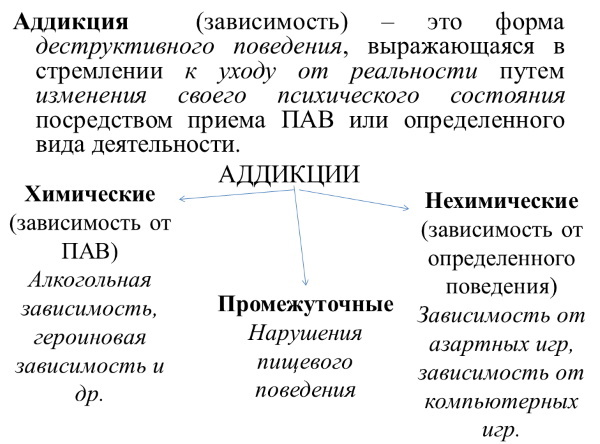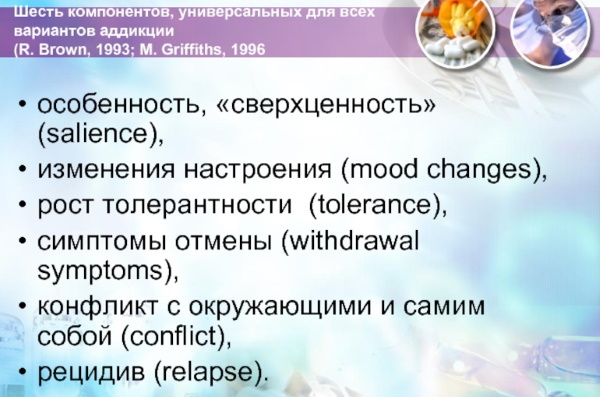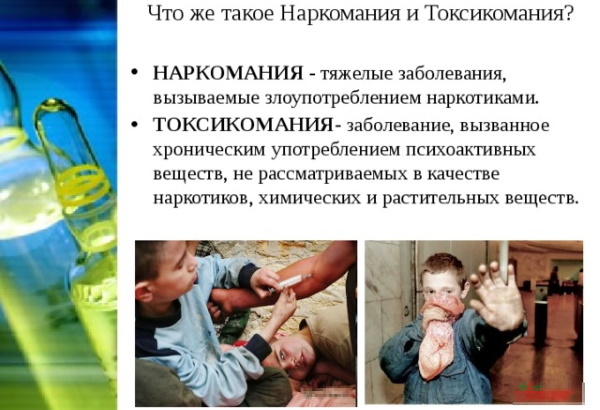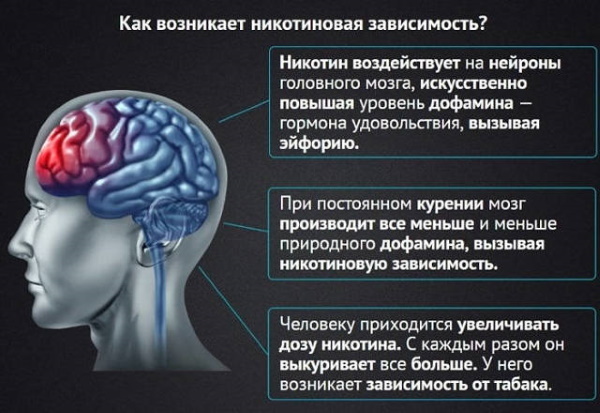Content
- What is addiction in psychology?
- The essence of the phenomenon of addiction
- The main signs of addiction
- How does it develop?
- Stages of development of psychological dependence
- The main types and principles of exposure
- Food addiction
- Religious addiction
- Sports addiction
- Addiction and substance abuse
- Love addiction
- Gambling addiction
- Alcoholism
- Nicotine addiction
- Why is psychological addiction dangerous?
- How to get rid of addiction and form good habits
- Psychology addiction videos
A person's perceived compulsion is called addiction. In psychology, this concept implies complex processes that lead to a violation of behavior, a person's lifestyle.
What is addiction in psychology?
Addiction in psychology is denoted by the term "addiction". The concept includes obsessive sensations or needs that a person experiences, they force him to act, harming his own health, people around him.
Any addiction requires treatment or at least awareness of the fact of its presence, since otherwise, with regular repetition of any lifestyle disturbances occur person. They are expressed in physiological and psychological disorders that manifest themselves in unusual behavior.

Experts classify addiction as a non-communicable or social disease. In recent decades, new factors have been observed that provoke addiction, its more rapid formation, and it is also found an increase in therapeutic resistance, that is, resistance to treatment or complication of the course of the disease without remission (continuously).
Obsessive hobbies are directly related to a person's desire to carry out actions through deformation of the way of his thinking. The problem is dealt with by specialists studying the science of addictive behavior, medical psychology and the theory of society. The most common forms of addiction are alcoholism, drug addiction, and toxicology.
The essence of the phenomenon of addiction
Scientists around the world have proven that there are certain biological mechanisms that are responsible for addiction. Although to this day this concept remains a subject of controversy, however, according to the conclusions of the participants in the discussion "Sociogenesis and Biogenesis" (about the role of upbringing and the influence of natural factors on the formation of the character of the personality), the reasons influencing the development of dependencies.
These include:
- genetics;
- DNA;
- psychological illness.
Any of these factors or their combination can dormant in a person up to a certain point, in which they are activated and manifest in the form of addiction influencing decision-making and actions person. Another theory is that conduct disorders can be associated with environmental influences that change a person's personality.
The reasons for such changes may include the impact of social contacts (dysfunctional families, companies). In this regard, the third group of scientific researchers determined the existence of influence on addiction, both social and physiological spheres, which create a model of human behavior.

Under the influence of physiological factors, obsessive drives appear due to the work of certain areas of the brain. An example of such processes is the release of dopamine, which is triggered under the influence of narcotic substances, which causes the fixation of addiction. In nature, dopamine is released during eating tasty food or having sex and acts as a stimulating effect in human behavior.
In Russia, there are disappointing statistics that clearly show the harm caused by addictions, its data are summarized in a table:
| Quantity / Percentage | Fact |
| 1,200,000 people in year | Mortality caused by alcoholism, drug addiction and smoking. |
| 20% | People suffering from alcoholism do not live to be 50 years old. |
| 60-80% | Marriages are falling apart due to developing addictions. |
| 70% | Suicides are drug addicts. |
| 60% | Patients infected with human immunodeficiency virus are drug addicts. |
| 235 people | Every day they get into drug addiction. |
| 98% vs. 96% | Correspondingly accounted for mortality from cancer of the larynx and lung cancer caused by smoking. |
Addictions are manifested in the need to perform certain actions and deeds despite the presence of adverse consequences of a psychological, social or physiological nature.
There are 2 levels of dependency:
- physiological;
- behavioral (psychological).

Examples of physiological dependence are the intake of drugs, drugs, alcohol. Behavioral addiction is gambling, shopping, extreme sports, love addiction, gambling addiction. All types of addiction have a characteristic feature: an increase in tolerance to the active substance (action). Due to this, the patient is forced to constantly increase the dose (time) of the poisonous substance (exposure).
The result is a loss of control over your life. When the moment of cessation of the implementation of actions comes, then the syndrome of "cancellation" occurs. It is accompanied by irritability, anxiety, pain symptom and a strong desire to keep repeating actions in order to get rid of unpleasant sensations.
The main signs of addiction
Addiction in psychology is a subject of controversy among scientists around the world.
Since 2011 a list of the main signs of addiction was compiled, which do not depend on its form:
- Deprivation of choice. The symptom is characterized by the patient's awareness that his actions are harmful to health, destroy relationships with loved ones.
- Loss of control. A person is not able to manage himself and control the situation, that is, he cannot push the object of desire aside no matter what.
- The systematic use of the object of desire. At some point, addictions become addicted and are transformed into the patient's life goal. Man is no longer able to separate his life and addiction.
- Denial of responsibility. Obsessive compulsions tend to give up responsibility for their actions. Patients come up with many excuses, even fantastic ones, to explain their actions.
-
Feelings of guilt, fear, and other negative emotions. Feelings of shame and anger often visit addicts after another breakdown. Emotions are not considered as a separate sign, since the same sensations are subject to healthy people, so they are taken into account only in conjunction with other symptoms of addiction.

- Self destructive behavior. As a result of the emergence of addictions, a person begins to realize that he is harming his health and his life, but at the same time he cannot stop.
How does it develop?
The development of addiction goes through several stages, arranged in chronological order:
- A person develops a desire to receive pleasure from any actions or substances, which replaces other desires and needs. Gradually, attraction becomes the only reason that gives a person the meaning of life. This phase is characterized by the presence of mental dependence. It is characteristic of absolutely all forms of addiction.
- The stage is characterized by the appearance of physical dependence. In this phase, the progression of the disease leads to intolerance of the moment when they are deprived of satisfaction from any need. Depending on the form of addiction, either withdrawal symptoms (withdrawal syndrome) or mental experiences appear. It begins to seem to a person that his addiction not only gives him satisfaction, but, as it were, eliminates his sufferings, which return when the object of desire is abandoned.
From a psychological point of view, the phases are characterized as follows:
- Corresponds with the theory of nonviolent management, when a person is driven by positive motivation in the form of satisfaction.
- The second phase of the development of the disease is already distinguished by a compulsory nature, that is, it is supported due to the appearance of pain, and the object of addiction becomes already a means of getting rid of it.
During the development of involvement, the consciousness of a physically dependent person begins to obey real circumstances, then there is when a single need arises, then in accordance with it, it controls thinking, feelings and behavior person.
Stages of development of psychological dependence
Addiction (in psychology, this is a sign of deviations) from chemicals (alcohol, drugs, drugs) is the initial stage of disorders that manifest themselves gradually.
Symptoms of pathology are:
- gradual degradation of a person;

- memory loss;
- periodic being in a state of euphoria;
- severing social contacts;
- loss of self-control.
The main symptom of addiction is emotional syndrome, which is manifested by abstraction from any experience. When using the object of attraction, a person gets an ephemeral feeling of comfort, avoiding problems, or temporary unconsciousness. Emotional syndrome develops as the disease progresses.
The stages of addiction development are the following phases:
- Initial acquaintance with a toxic substance, a prerequisite for which is a positive outcome, that is, obtaining satisfaction.
- Desire to change mood after successful use of the attraction object. A person begins to look for reasons for himself in order to apply it again. At the same time, a picture of healing from mental suffering, removal of irritability or obtaining emancipation, freedom looms before him. This stage is characterized by the absence of an emotional syndrome. The problem is further aggravated by the presence of suitable genetics.
- The beginning of addiction. At this time, symptoms of deterioration in psycho-emotional and physical health begin to appear after receiving the next dose. The toxic substance has a detrimental effect on the mental system and destroys it. A person's behavior changes, he may become inadequate, uncontrollable, his memory may disappear. A person experiences a sense of shame for his behavior, but at the same time he begins to lie and fantasize, justifying his actions. A person deceives himself, and thereby loses the thread of reality. He is tormented by remorse, they cause even greater harm to the psycho-emotional sphere, thereby increasing attachment to the object of desire.
- Forced use to improve the condition. A person ceases to see the meaning of life without receiving the next dose. When taking a small dose, it turns out that it does not solve his problems, that is, happiness does not come, so the amount of the substance taken has to be increased. At the same time, the emotional background only worsens and the person absolutely does not want to get out of the state of dependence, constantly accumulating negative emotions, he goes into the world of illusions.
The main types and principles of exposure
The main types or forms of dependence are:
- food;
- alcoholic;
- nicotine;
- religious;
- game;
- toxicological (medicinal);
- narcotic;
- love;
- sports.
Food addiction
Addiction (in psychology, this concept implies deviations in behavior and emotional sphere) from food is a non-chemical addiction, when a person does not use food to satisfy hunger, but in order to cope with anxiety and excitement.
Food in this case serves as an object that improves mood and well-being. Addiction has many forms from the obsessive desire to lose weight, food selectivity, to the fight against excess weight.
Signs of food addiction include:
- having constant thoughts about food;
- inability to control yourself;
- impulsive desires to "seize" trouble;
- rewarding yourself with food;
- the presence of withdrawal symptoms.
Religious addiction
Religious obsession is a non-chemical psychological dependence on a totalitarian sect. It is characterized by the establishment of any social or personal relationship through religion. At the same time, there is a rejection of one's own need for God. This fact confirms that the bulk of people who fall into sects are in a state of psychological crisis or despair under the influence of external factors.
A distinctive characteristic of this type of addiction is that a person has a stable need shifting responsibility for your relationship with God onto a strong teacher (guru) who is endowed with unlimited power.

Symptoms of this addiction are:
- lack of the ability to think, doubt;
- thinking in black and white;
- feelings of shame;
- confidence that God can do everything for a person without his serious participation;
- obsessive following of the rules;
- breaks in previous contacts and relationships;
- manipulation of the holy letter;
- constant happy facial expression;
- a sense of superiority over all of humanity.
Sports addiction
Sports addiction is a manifestation of the desire to engage in extreme sports professionally or with the goal of higher achievements. The condition is characterized by a person's obsessive attraction to sports activities. Addiction refers to chemical addiction, as exercise promotes the production of endorphins that improve mood.
Psychologically, dependence is manifested in the presence of the following signs:
- emotional coldness;
- perfectionism;
- neuroticism (emotional instability);
- anxiety;
- conflicts;
- impulsiveness.
Most often, young and middle-aged men fall under the addiction.
Addiction and substance abuse
Addiction (in psychology, this is an obsessive behavior that requires treatment) on drugs is a disease that is caused by chemical dependence on opioid or psychotropic drugs. As a result of their application, physical and mental attraction develops.
Psychic addiction consists in the desire to obtain inner balance through narcotic means, physical manifestations are found in the "withdrawal" syndrome, which occurs in the absence dose. The consequences of the disease are severe psychoses due to intoxication, degeneration of internal organs.

Addiction to toxic substances is one of the most malignant types of drug addiction, which leads to the destruction of the body and the development of strong addiction. Most often, children between the ages of 8 and 15 become addicted, who want to get freedom and violate the prohibitions of adults. These can be children from dysfunctional families or with a liberal parenting style.
Signs of substance abuse and drug addiction include:
- a sharp change in mood;
- depression;
- disorientation in space;
- absent look;
- discoloration of the skin;
- dilated pupils.
Depending on the type of substance, the following types of substance abuse are divided:
- gasoline;
- acetone;
- glue;
- solvent for nitro paints;
- medicinal (appears through addiction to various drugs: sleeping pills, sedatives, analgesics).
Love addiction
Love addiction is a type of chemical attraction. It is a form of mental illness that is characterized by a codependent relationship between two people.
Scientists' studies have shown that the subjective state of falling in love is closely associated with physiological reactions that take place in the brain. Biologically active substances take part in them: dopamine, oxytocin, vasopressin, serotonin. Due to the active release of these substances, a person falls into a state of addiction.
Gambling addiction
Addiction in psychology is a problem that includes an irresistible craving for games (video, computer, gambling). Science knows cases when, if it was impossible to overcome an attraction, it led to fatal consequences. The factors influencing the development of the disease are the presence of an unformed, unstable psyche and a lack of self-control.

It also includes social aspects in the form of dissatisfaction with life and the desire to compensate for their unfulfilled desires in the virtual world. Psychological dependence is manifested by mental disorders, which are expressed in depression and phobias. One of the types of pathology is Internet addiction.
Alcoholism
Alcohol addiction is a chemical addiction characterized by a strong craving for alcoholic beverages and their regular use. Physical dependence manifests itself in the "withdrawal" syndrome, the presence of which distinguishes pathology from simple alcohol abuse.
Symptoms of the disease are:
- a strong, uncontrollable urge to drink;
- an increase in the amount of alcohol taken;
- increasing tolerance;
- withdrawal syndrome in the form of nausea, sweating, tremors.
In some cases, a state of shock develops, which leads to the death of the patient. Addiction causes irreparable harm to health in the form of liver disease, damage to the digestive system, and dementia. Pathology can destroy not only the physical and psychological health of a person, but also his family and relationships with people around him.
Withdrawal symptoms are explained by the fact that the active substance of alcohol - ethanol is rapidly absorbed in the stomach and enters the human brain, where it destroys nerve cells, introducing it into a state of euphoria, drowsiness or excitability. As a result of regular abuse, the body rebuilds the metabolism and can no longer do without the next dose. Psychic dependence is explained by the removal of feelings of anxiety, unconsciousness.
Nicotine addiction
Nicotine is a psychoactive ingredient in tobacco products. It affects the central nervous system and is addictive by acting on the brain cells responsible for dopamine production. Nicotine can cause withdrawal symptoms. The consequences of smoking are physical harm to health (cough, respiratory failure) and mental disorders in the form of irritability, mood swings.

Dependence is manifested by the following signs:
- a passionate desire to smoke;
- irritability;
- feeling unwell;
- weakness;
- feeling of anxiety;
- insomnia;
- increased appetite;
- cough and headache.
Why is psychological addiction dangerous?
Psychological addiction is a deviation in a person's behavior that addiction imposes on him. As a result, he turns to unhealthy relationships with the outside world. People suffering from any form of addiction are not able to live their own lives, they do not have their own desires and needs, and they fill all the spiritual emptiness with an obsessive attraction.
Despite the craving for stable relationships, mentally dependent people have disabilities, they have there is practically no chance of creating a normal family, as they suffer from low self-esteem, emotional disorders. People often lose their jobs, homes, and even lives due to harmful attractions.
How to get rid of addiction and form good habits
Scientists around the world have proven that the only effective way to get rid of addiction is to participate in self-help groups. They are gatherings of people who share the same addiction. The most famous example of such groups is the Society of Alcoholics Anonymous.
Self-help communities are supported by voluntary donations from their members. Different groups may use different methods of getting rid of addiction. They can be of both a religious nature and social and social action. The 12 Steps program is part of many self-help groups.
It works according to the algorithm of actions:
- Acknowledgment by the patient that he has a problem.
- Analysis of a person's lifestyle with the help of other group members.
- Conducting actions to correct errors.
- Learning new life rules and behavior without addiction.
- Helping other people who have the same problems.
Medication is a method of dealing with physical addiction. In modern times, Methadone and Buprenorphine are widely used for the treatment of drug addicts. The goal of therapy is the socialization of patients.
The most recent scientific research has discovered a number of vaccines that act against certain drugs and nicotine. With the help of vaccines, it was possible to synthesize antibodies that prevent the action of toxic drugs. In modern times, these funds are being tested in humans for the purposes of prevention and recovery of addicted patients.
In case of addiction in close people, it is necessary to contact specialist psychologists, narcologists, psychotherapists, since these are physiological and behavioral disorders that can even lead to lethal outcome.
Psychology addiction videos
Addiction and Addictive Behavior in Psychology:
